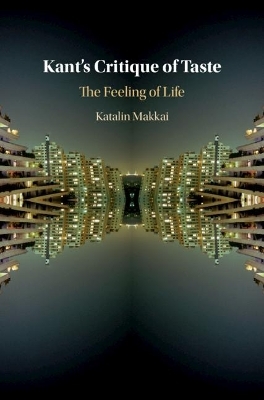
Kant's Critique of Taste
The Feeling of Life
Seiten
2021
Cambridge University Press (Verlag)
978-1-108-49779-4 (ISBN)
Cambridge University Press (Verlag)
978-1-108-49779-4 (ISBN)
This book offers a new interpretation of Kant's aesthetics in the Critique of Judgment that shows its relevance to contemporary debates. It is aimed at philosophers, primarily those interested in Kant or in aesthetics, but it will also interest scholars of art theory, criticism, and cultural theory.
Immanuel Kant's Critique of Judgment is widely recognized as a founding document of modern aesthetics, but its legacy has fallen into disrepute. In this book Katalin Makkai calls for the rediscovery of Kant's aesthetics, showing that its centerpiece, his investigation of the judgment of taste, paints a compelling portrait of our relationships with works of art that we love. At its heart is a scene of aesthetic encounter in which one feels oneself to be 'animated' - brought to life - by an object, finding there to be something in one's experience of it, beyond what there is to know about it, that one wants to explore and articulate. Tracing Kant's insight that to judge is to reveal one's sense of what bears judging, and hence of what matters, Makkai situates Kant's aesthetics within his larger study, begun in the first Critique, of judgment's fundamental role in the life of the mind.
Immanuel Kant's Critique of Judgment is widely recognized as a founding document of modern aesthetics, but its legacy has fallen into disrepute. In this book Katalin Makkai calls for the rediscovery of Kant's aesthetics, showing that its centerpiece, his investigation of the judgment of taste, paints a compelling portrait of our relationships with works of art that we love. At its heart is a scene of aesthetic encounter in which one feels oneself to be 'animated' - brought to life - by an object, finding there to be something in one's experience of it, beyond what there is to know about it, that one wants to explore and articulate. Tracing Kant's insight that to judge is to reveal one's sense of what bears judging, and hence of what matters, Makkai situates Kant's aesthetics within his larger study, begun in the first Critique, of judgment's fundamental role in the life of the mind.
Katalin Makkai is Professor of Philosophy at Bard College, Berlin. She has published articles on Kant and film, and is the editor of Vertigo (2012).
Introduction: a twofold peculiarity; 1. The art of judgment; 2. Communication and animation in the judgment of taste; 3. Subjectivity and recognition in the judgment of taste; 4. Modes of attunement; 5. Aesthetic liking.
| Erscheinungsdatum | 08.04.2021 |
|---|---|
| Zusatzinfo | Worked examples or Exercises; 6 Halftones, black and white; 10 Line drawings, black and white |
| Verlagsort | Cambridge |
| Sprache | englisch |
| Maße | 160 x 235 mm |
| Gewicht | 460 g |
| Themenwelt | Geisteswissenschaften ► Geschichte |
| Geisteswissenschaften ► Philosophie ► Geschichte der Philosophie | |
| Geisteswissenschaften ► Philosophie ► Philosophie der Neuzeit | |
| ISBN-10 | 1-108-49779-9 / 1108497799 |
| ISBN-13 | 978-1-108-49779-4 / 9781108497794 |
| Zustand | Neuware |
| Informationen gemäß Produktsicherheitsverordnung (GPSR) | |
| Haben Sie eine Frage zum Produkt? |
Mehr entdecken
aus dem Bereich
aus dem Bereich
eine Geschichte der Zuversicht von Homer bis zum Klimawandel
Buch | Hardcover (2024)
C.H.Beck (Verlag)
28,00 €
die kolonialen Wurzeln der französischen Theorie
Buch | Hardcover (2024)
Matthes & Seitz Berlin (Verlag)
28,00 €


